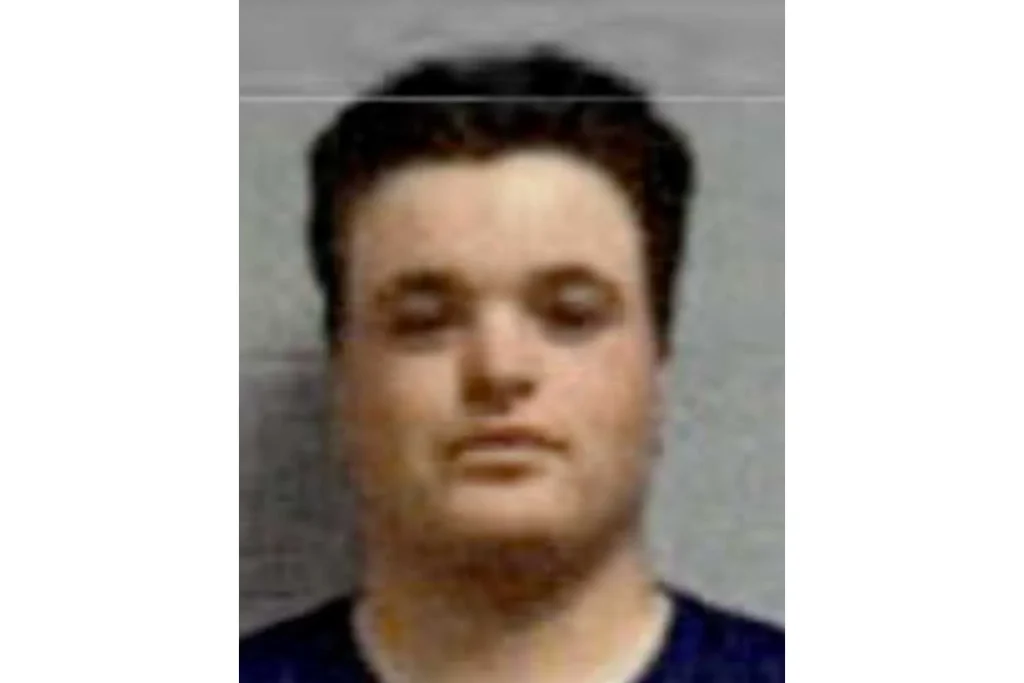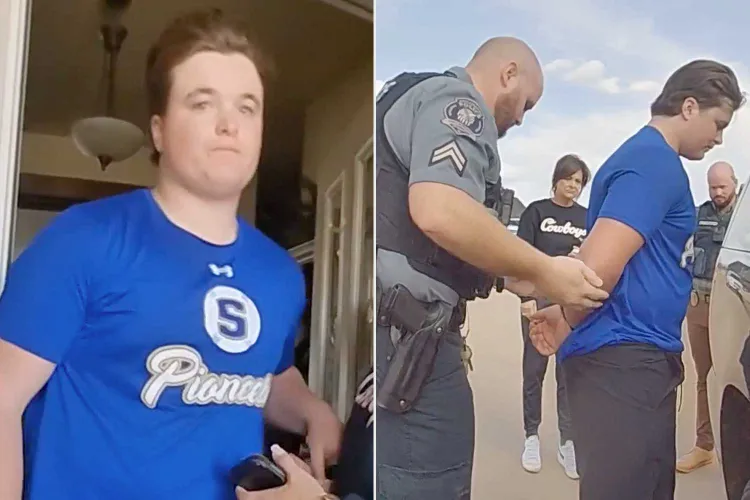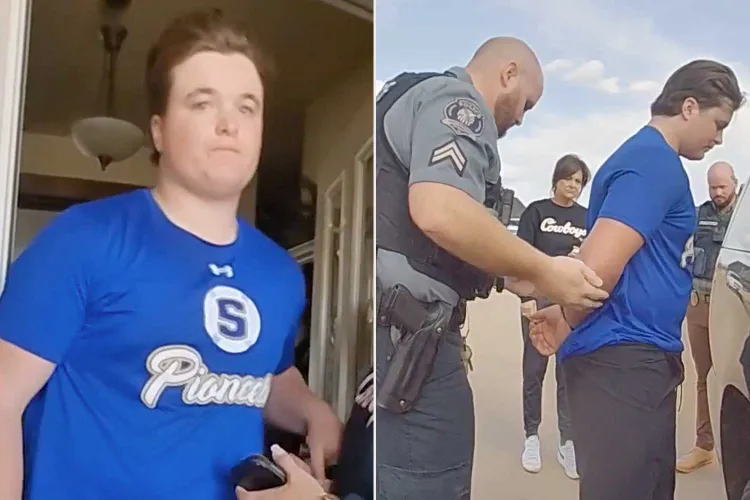Oklahoma Outrage: Teen from Prominent Family Convicted of Raping and Strangling Two Girls Was Facing 7 Decades Behind Bars — Then a Judge Let Him Walk Free
In the quiet college-town surroundings of Stillwater, Oklahoma, the shock that rippled through the community was visceral. It was a day when the promise of justice felt painfully hollow for victims, their families and many observers. The case of 18-year-old Jesse Butler has laid bare deep fault lines in the system — between accountability and leniency, between trauma and closure, between the letter of the law and the lived reality of survivors.

As the facts now stand, Butler was arrested in March 2025 after two high-school-aged girls came forward with multiple allegations of sexual assault, domestic violence by strangulation and other charges. Court records obtained by media outlets show Butler, then 17 years old, was initially charged as an adult in Stillwater, Oklahoma, facing multiple counts including first-degree rape, rape by instrumentation, attempted rape and domestic assault and battery by strangulation. According to official reports, one of the victims reported being strangled until she lost consciousness, and alleged that Butler told her he wanted to film the act. The charges spanned numerous incidents over months.
Yet despite the severity of the allegations and the initial exposure to a potential 78-year prison sentence, the outcome did not reflect the magnitude of that potential punishment. Under a plea agreement approved in August 2025, Butler pleaded “no contest” to 11 counts — and was classified as a “youthful offender” rather than being held strictly as an adult. Instead of incarceration, Butler was ordered to complete community service, counseling, adhere to curfews, daily check-ins and a ban on social media, with his full adult sentence held in abeyance — only to be triggered if he violates the terms.
From the point of view of the victims and their supporters, the sentence feels inadequate — a betrayal. One mother, speaking to local media, said: “My daughter has handled this with more strength than most adults could… Watching her stay brave while adults failed her has been both inspiring and heartbreaking.” A teenage victim impact statement quoted in court recounted: “You didn’t just strangle me with your hands, you strangled my voice, my joy, my ability to feel safe in my own body.”
Community outrage turned into public protest. Outside the District Attorney’s Office of Payne County and the courthouse in Stillwater, more than a hundred people gathered carrying signs demanding accountability. Some called for a grand-jury review; others demanded reforms to juvenile sentencing laws. State Representative Justin “JJ” Humphrey labelled the ruling “unacceptable” and signaled his intent to push for legislative changes.

Key to the controversy is the application of Oklahoma’s “youthful offender” statute. Prosecutors in the case say the law allows supervision until the defendant’s 19th birthday, giving a chance for rehabilitation while still holding a defendant accountable. But critics argue that the statute was never meant for violent sexual predators and that permitting such a pathway risks minimizing the trauma of the victims and undercutting public safety.
Part of the frustration grew from Butler’s family background and standing in the community. Reports indicate he comes from a prominent local family; his father previously served in a key operations role within the athletics department of Oklahoma State University — a detail that fueled the widespread impression of preferential treatment. For many, the message was clear: privilege still holds sway, even in moments when the stakes feel most profound.
The timeline reveals that the original investigation stemmed from calls made to a school resource officer in Stillwater after the victims reported ongoing abuse. The charges were filed in March 2025. One article notes the first incidents may have occurred off school grounds at a fast-food location, and later one of the victims alleged being followed into her house and forced into a car for hours while being sexually assaulted. Following the no-contest plea, Butler was sentenced on August 25, 2025, to the 78-year term — but the term has been fully suspended contingent on his completion of the youthful-offender program.
For the victims’ families, the sense of relief one might expect from a sentence is missing entirely. Instead they cling to anger and disappointment. One mother lamented that her daughter had to repeatedly prove she was the victim — while the system “made excuse after excuse” for the person who hurt her. There is also mounting concern that this case sets a precedent: if someone accused of repeated rapes and strangulation can avoid prison time, what message does that send to survivors, to those considering coming forward, to future defendants?
There are also those who caution against a rush to judgment. Legal experts note that youthful-offender statutes often reflect a societal belief in rehabilitation over pure retribution, particularly for defendants who were minors at the time of their crimes. The DA’s office stated that the law “does not erase the crimes or minimize their impact,” and that the supervisory approach still holds Butler accountable — albeit in a non-traditional way. But for many, the optics and the outcome do not align with the gravity of the offenses.
In the small community of Stillwater — where students walk familiar streets and the university’s presence looms large — the ripples from this case have been widespread. Local police, victim-services organizations and school officials have seen renewed scrutiny. Outside the Ponca Tribal Victim Services, statements of support for the victims underscored the deeper implications of the deal: “We are standing in solidarity with survivors demanding justice!” the organization wrote in a Facebook post, naming Butler directly.
Meanwhile, social-media groups and petitions have gathered signatures demanding transparency around how youthful-offender status was applied. One petition posted on MoveOn argues that the classification “was meant for minor crimes, not premeditated sexual violence,” and calls for the release of full data and future policy reform. At the heart of the backlash is not only anger at the sentence but deep anxiety over system failures: of power, of privilege, of voices unheard.
The case raises difficult questions about the intersection of youth and violence. Should a high-school-age offender who commits multiple rapes and strangulation assaults be treated the same as a juvenile first-time offender? At what point does rehabilitation give way to punishment? And how should the community balance the rights of the accused with the needs of survivors for acknowledgment, safety and closure? These are not easily answered, but many in Stillwater feel the scales have tilted badly wrong.
One of the victims reportedly required surgery for neck injuries after being strangled. The trauma did not end when the assault was over: the psychological scars, the isolation, the fear of being believed — all of it captured in the statements quoted in court. For her and so many others, the sentence is not a new chapter; it’s a reminder that the fight continues.
In the coming months, Butler is required to comply with an extensive supervision plan: counseling, check-ins, community service, curfew and restrictions on technology and social media. He faces a compliance hearing in December where the court will determine whether the conditions have been met — if not, the original 78-year sentence could be activated. Whether that possibility offers real deterrence or hangs like a sword of Damocles remains to be seen.
For the broader community, the sentiment is beyond anger — it is a call to action. Advocates say this is a moment when state law, prosecutorial discretion and public accountability must be reassessed. If the youthful-offender statute is being used in cases of violent sexual assault, many argue, then the statute’s boundaries must be explicitly redrawn — and the community must be part of the conversation.
Stillwater is a town where young people grow up under the gaze of athletics, academics and small-town connections. When one of those young people becomes the center of a case like this, the reverberations are immense. It isn’t simply the facts of the case, though they are severe enough; it’s the undercurrent of trust eroding, of systems failing survivors, and of questions of fairness rising in public view.
The families of the two victims now carry a different burden: not just the assault itself, but the fight for recognition that follows. The justice system, in their view, was meant to protect their daughters first — and when it didn’t, the wound deepened. Many parents said they will never stop pushing, never stop reminding the court, the law enforcement agencies and the public of what transpired.
For his part, Butler’s defense and the prosecution insisted that the arrangement provides accountability — just in a different form. They argued that incarceration may not always be the correct path for someone barely out of adolescence. But for the victims, there is no consolation in that. For them, justice is measured not in community service hours or therapy sessions, but in seeing the full weight of the offense recognized and the offender required to face the consequences.
As Stillwater watches and waits, the question remains: will this case become a wake-up call for systemic change, or will it quietly fade with time, leaving the survivors once again to bear the burden of memory and pain? Either way, the story of Jesse Butler and the two young women is not one the community will forget — and it may yet shape how Oklahoma handles violent offenses by minors for years to come.


